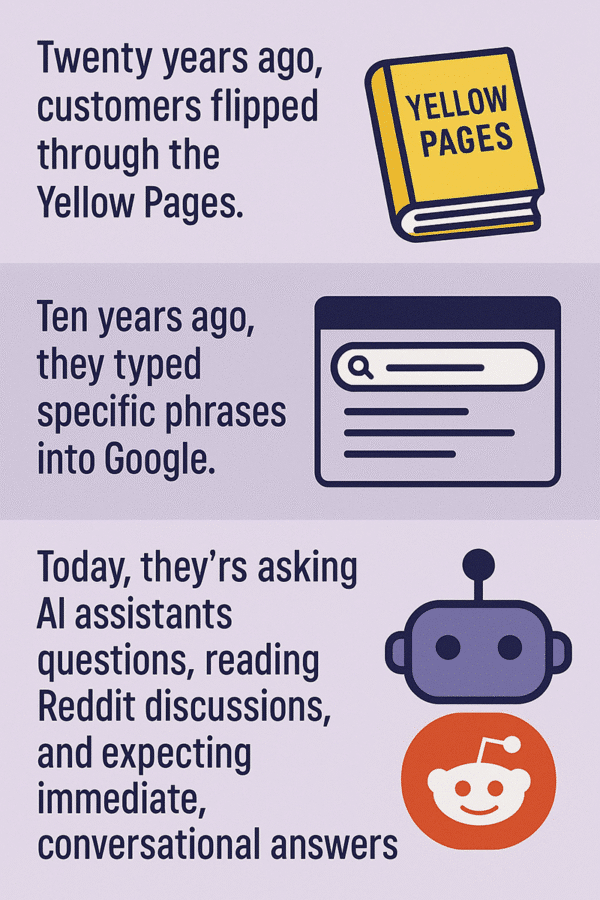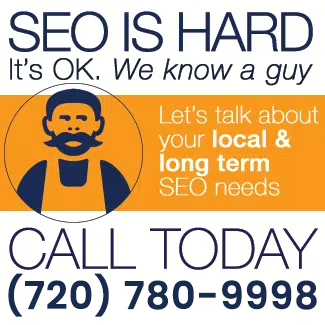A Practical Guide to the Changing Search Landscape
If you’re running a small business in Denver, you’ve probably noticed something frustrating lately: getting found online keeps getting harder. The way customers search for businesses has shifted dramatically, and what worked even two years ago isn’t cutting it anymore.
Need help implementing these strategies? The Affordable Web Guy has been helping small businesses since 2007 with customized website design and SEO services that build authentic online presence.
Here’s what’s changed. Twenty years ago, customers grabbed the Yellow Pages. A decade ago, they typed “Denver plumber” into Google. Now? They’re asking AI assistants questions like real people, browsing Reddit threads for honest opinions, and expecting instant answers to complex problems.
I’m going to walk you through five strategies that actually work in this new landscape—not the usual SEO advice you’ve heard a thousand times before.
What’s Really Happening in Search Results?
Let’s start with some real data. A Pew Research Center study found that roughly 18% of Google searches now trigger AI-generated summaries at the top of results. When people see these summaries, they click on actual websites about half as often compared to regular search pages.
Even more telling: only 1% of users click on the source links within those AI summaries. So if you’re one of the “sources” that AI cites, don’t expect much traffic from it.
Meanwhile, people keep adding “Reddit” to their searches because they want real opinions, not polished marketing copy. Reddit’s visibility in Google results has surged following recent algorithm changes, according to SEO analysis from Stan Ventures.
This creates a weird situation for Denver businesses. Traditional SEO is losing its punch, but authentic businesses that genuinely help their communities have better opportunities than ever to stand out.
 How Can You Own Your Specific Expertise?
How Can You Own Your Specific Expertise?
Stop trying to rank for “Denver restaurants” or “home repair services.” Instead, zero in on the particular problems you solve better than anyone else. AI systems look for authoritative sources they can cite with confidence.
Make Your Content Citation-Worthy
Here’s a real example: say you own a heating company in Denver. Instead of writing generic “HVAC maintenance” content, you might create guides like “Preparing Your Furnace for Denver’s Unpredictable Spring Weather” or “Why Denver’s Altitude Wreaks Havoc on Air Conditioning Systems.”
Write these pieces like you’re answering a customer’s direct question. Lead with the answer, then explain your reasoning. Draw from your actual experience working in Denver’s climate and housing conditions. When AI scans for reliable information, it’ll find your expertise.
Here’s the thing: you’re not just creating content for search engines anymore. You’re creating content that search engines will quote. Every piece should be something you’d proudly have cited as the definitive answer.
Where Should You Meet Your Customers Online?
Your customers are already talking about their problems online—especially on Reddit and local forums. You need to be part of those conversations, but not as a salesperson.
Finding the Right Communities
Seek out the Denver subreddits, neighborhood Facebook groups, and industry forums where your customers ask questions. When someone posts about dealing with clay soil or choosing high-altitude plants, offer genuinely helpful advice based on your professional experience.
This isn’t about promotion—it’s digital networking. Let your expertise speak for itself while your business info sits quietly in your profile. People remember helpful experts, and search engines increasingly surface these community discussions in results.
The payoff works two ways: you build trust with potential customers, and your helpful contributions become discoverable by future searchers.
Why Does Content Quality Matter More Than Ever?
Quality content has become the foundation for everything else you do online. But here’s what most businesses get wrong: they create educational content that attracts visitors but never converts them into customers.
Instead, create content that directly addresses the buying process. Think about the specific questions customers ask right before they hire you. What are their biggest concerns? What objections do they raise? What insights help them understand your value?
A Denver wedding photographer shouldn’t write about “Wedding Photography Tips.” Better topics: “What to Expect from Your Denver Wedding Photography Investment” or “How Denver’s Mountain Light Actually Benefits Your Wedding Photos.”
Every piece should connect to a business goal with clear calls to action and specific examples from your Denver work. You’re not just attracting visitors—you’re helping qualified prospects take the next step.
How Can Local Knowledge Give You an Edge?
Authenticity has become your biggest competitive advantage these days. Search engines actively look for signals that content comes from real experience rather than generic research.
Your Denver location isn’t a limitation—it’s actually an asset. You understand things that national companies and AI systems can’t: how Front Range weather affects operations, which neighborhoods have unique needs, what local regulations matter to customers.
Document this knowledge systematically. Interview long-term customers about their experiences. Share behind-the-scenes insights from your work. Create case studies showing your problem-solving process with specific Denver clients.
If you run a construction company, write about navigating Denver’s permitting process, dealing with expansive clay soils, or scheduling around Colorado’s hail seasons. This location-specific expertise can’t be replicated by AI or generic competitors.
Become known as the local expert who understands both the technical aspects of your work and the unique context of operating in Denver.
What Should Replace Traditional Keyword Targeting?
Targeting specific keyword phrases is becoming less effective because AI systems understand context and intent much better than older algorithms. The Pew Research data shows that 88% of AI summaries cite multiple sources, indicating these systems synthesize information rather than match exact phrases.
Focus on Intent Instead of Keywords
This actually simplifies your job once you get it. Instead of guessing which phrases people might type, zero in on the deeper questions and concerns behind their searches.
Start with your customer conversations. What problems are they really trying to solve? What outcomes do they want? Create focused pieces addressing different aspects of these needs rather than cramming everything into one article.
Someone searching for “Denver small business accounting” might actually want to know about Colorado tax implications, handling seasonal cash flow, or affording their first employee. Create separate pieces for each concern, then link them strategically.
This approach serves both customers and search engines better than trying to stuff everything into one massive article.
What’s Coming Next for Search?
Many searches won’t result in website visits at all. The Pew Research findings confirm that users encountering AI summaries often end their browsing sessions without clicking anything.
Building Authority Beyond Website Visits
This doesn’t diminish your website’s importance. It means thinking strategically about building reputation and authority even when people don’t visit directly. Every helpful piece of content, every thoughtful community contribution, and every satisfied customer who mentions your work online builds your presence in Denver’s business ecosystem.
The businesses that thrive will focus on genuinely serving their communities rather than gaming the system. Your local knowledge, real experience, and commitment to solving customer problems are your strongest assets as search technology evolves.
Stick with these strategies consistently, and you’ll become more visible and attractive to Denver customers who need what you offer, regardless of how search continues changing.
Sources:



Leave A Comment